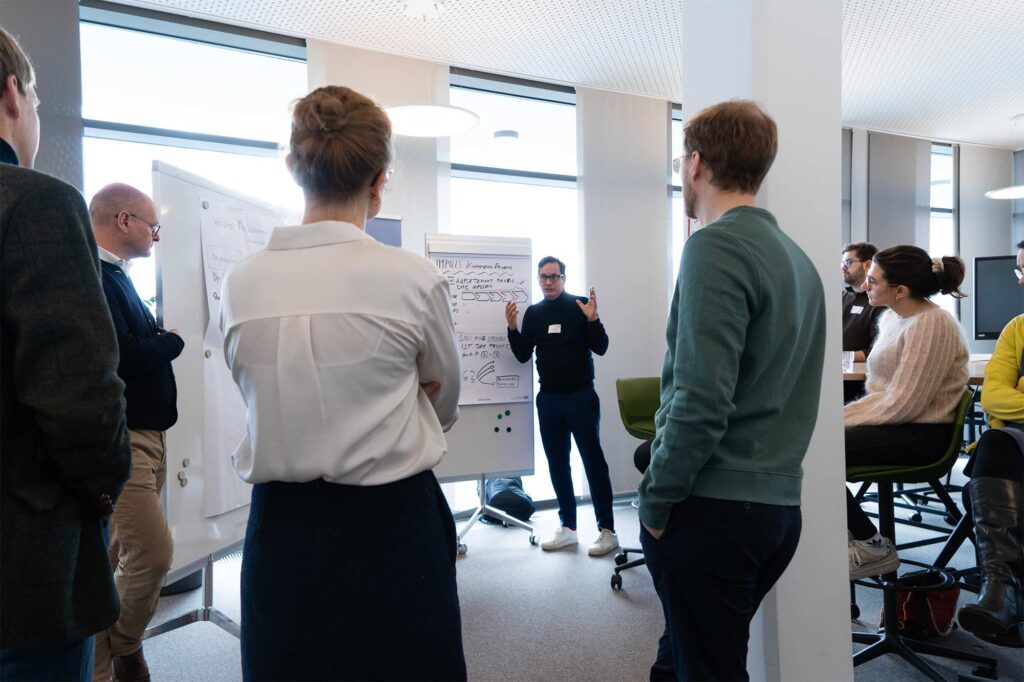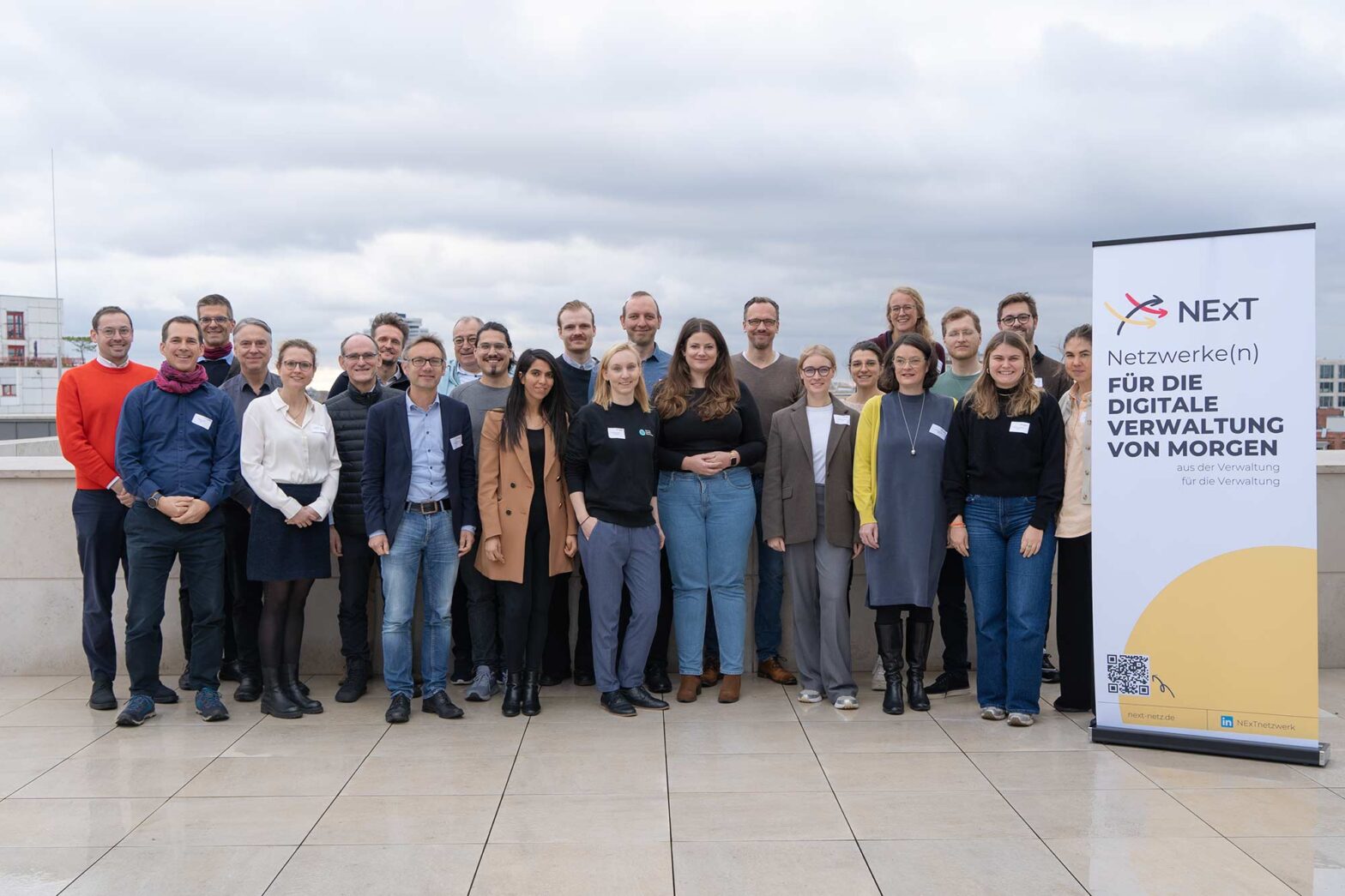It’s mid-late November again. So, the NExT network invited to its annual autumn conference. NExT is the host of Germany’s public sector communities of practice, and this was the annual get-together of the people behind it.
After travelling to Boppard in 2022 (see weeknote #29) and Wiesbaden in 2023 (see weeknote #81), people gathered in West Berlin this time.
We got together in the space of the German state pension provider Deutsche Rentenversicherung Bund close to fancy Ku’damm. It’s an organisation that has been building up its agile and user-centred design capability in the past year or so. They hired user researchers, service designers and agile coaches and shaped a compelling internal support offering. As part of break-out sessions, we learned more about it.

Connecting with other public sector community leads
How do others lead their communities? What do they see as the most significant barriers to digital transformation in Germany? What approaches do they take to mitigate that, and what can we do jointly?
The 2 half-day format allowed for plenty of exchange in networking walks, group discussions and workshops. Each community had prepared posters giving an update on their efforts – how often they meet, what topics they discuss, and who’s behind.
I attended a workshop offered by colleagues from the pension provider, who shared how they are scaling methodological expertise. Their growing agile and user-centred design team is part of the digital strategy’s coordination centre, which gives them some visibility, budget, and influence.
On day 2, my colleague from the Ministry of the Interior Ralf co-ran a workshop on applying and implementing the Service Standard. We will have to pick the dedicated minds of NExT again in the coming weeks and months. The various communities are vital in spreading the word and shaping related guidance.
NExT’s events and communities of practice play a massive role in knowledge management and coordinated strategising. With their user researcher, Theresa, having now conducted a solid study into the benefits, I hope the necessary funding can be secured for the foreseeable future. Cause, as we painfully have seen in the UK and other places, support for communities comes and goes in waves. So, you better prepare yourself for the next tide.
So justified: @oecdgovernance.bsky.social recognises @nextnetz.bsky.social as exceptional practice for public sector knowledge exchange. There are now 17 active communities of practice across a broad number of topics: open source, user-centred design, AI and digital ethics, innovation management.
— Martin Jordan (@martinjordan.com) November 21, 2024 at 12:59 PM
[image or embed]
Talking to accessibility commissioners about accessibility
A talk on accessibility I gave this week was a success and failure at the same time.
Last week, I was asked if I could talk at a networking event on Tuesday. I had little context and said I would check my availability. Upon research, I understood there is a coordinated network of about 180 accessibility specialists in Germany’s Federal government—in ministries and federal agencies—who regularly get together. They started doing so in 2022 and come together twice a year, once in person. Without a shared Slack instance, the discovery of such activities remains so hard. That’s why I never heard about them. They have never heard of Digital Service either.
Out of 80 people attending, 2 people had heard of the Service Standard, and about 5 people had heard of the NExT network. It still puzzles me how difficult cross-public sector communication is. There is no way to connect the intranets of ministries and their agencies, so many people seem always out of reach. There is possibly so much good experience and knowledge that’s never shared because people don’t know who, where, and how to look.
I delivered the talk I gave in October at the Smart Country Convention: “No digital offering is barrier-free – and how we change that”.
Many of the audience were delighted and astonished to see what we are already doing in the accessibility space. Also, the departmental colleagues had not come across anything we did or do. After the talk, one person asked if they could stop by to shadow us at work. Another person says they will complain inside their department about the ineffective communication – as we are working closely with that department while the work isn’t discussed in internal channels. So, my input struck a cord, and people got something out of it.
One person who identifies as deaf and uses German sign language as their first language gave me harsh feedback, though.
Harsh feedback after my #accessibility talk today. One attendee is using German sign language as their first language. According to them, my talk: • used too many English terms • was too fast for the translators to follow • did not come with any pre-reading material to understand some concepts
— Martin Jordan (@martinjordan.com) November 19, 2024 at 4:39 PM
[image or embed]
I learned who I was speaking to only a day before I delivered the talk. I had no heads-up from the organisers that I would have to ensure my talk works for deaf people with German Sign Language, and it’s difficult to anticipate that. The two main organisers got sick, and my point of contact probably didn’t know or was too busy with taking over for them. So, I did not realise there would be sign language interpreters who needed preparation and a certain slower speed.
Consequently, I learned that some English terms like ‘WCAG’ had to be translated by a sign language interpreter using manual alphabet and fingerspelling, which takes extra time and is cognitively demanding.
I believe I got pretty good at ensuring blind and low-vision attendees have a good experience during my talks. I read every slide and explained every picture used. However, I wrongly assumed that certain concepts are well-known and established when talking to an audience of digital accessibility specialists and accessibility commissioners. That was only partially the case.
Following up after the event, I understood that some people in the audience are also responsible for accessible documents and social media. In addition, all too often, all web-based development is entirely outsourced. Additionally, a separate web editorial team might handle the departmental website. So, some WCAG-related terms are far away from them. I assumed I spoke to knowledgeable accessibility experts, but that was only partially the case.
I will stay in touch with these federal government accessibility folks. Some are eager to meet again. Marion and I also discussed offering our one-hour accessibility onboarding session to them remotely if they are interested. I suggested we involve and consult them in setting up the first version of our empathy accessibility lab.
Making Service Standard peer reviews visible
I finished the blog post on our peer reviews this week so that it can be published next week. After a writing rush last Sunday, the draft is complete and has been reviewed by our editor. I am still getting a quote from the team whose service we reviewed at the beginning of the month.
Both of my co-authors are out of the organisation at the moment of publication. It helps make their work visible.
We’ll publish it together with 2 new Service Standard peer review reports and a new how-to guidance on running peer reviews. That guidance should eventually merge with an updated service manual in 2025.
Unrelated but linked to our other Service Standard workstream, we did some strategic communication planning for vital stakeholders to get the Service Standard version 2 formally agreed upon. We are working against some ambitious timelines to put together a German industry norm, a local version of a lightweight ISO norm. It’s something that keeps our team very busy currently cause we want to get this right.
Preparing next community events
As I realised before, community events come in waves.
Currently, I’m preparing the upcoming NExT community exchange. It will take place on Tuesday, 26 November. We will discuss the topic ‘holistic service design’. The City of Hamburg and my colleagues working on parental benefits will share some of their work.
For the week after, we are trying to finalise the speaker setup for the public-facing meetup on ‘checks and balances’. I designed the poster, my fourth for the meetup series this year. The event returns to CityLAB, and I hope we can get some people interested in the topic.
Final poster for the year is done. To keep designing occasionally, I make the posters for our quarterly public-facing public sector meetup. We run it to make innovative public sector work visible and have a dialogue with members of the public on changing topics. December theme: Checks & balances
— Martin Jordan (@martinjordan.com) November 20, 2024 at 1:03 AM
[image or embed]
I should also dedicate some time to more international community activities again, but I have too many other things on my plate right now. I hope we can do that in December.
What’s next
My colleagues Julian and Paul will talk at Code for America’s Form Fest. I am very excited and look forward to a rehearsal next week.
“Better government, one form at a time” – #CodeForAmerica ’s #FormFest is happening again on 4 Dec. My @digitalservice.bund.de colleagues Julian and Paul will discuss ‘Triangle of success: involving the right parties into the form design process’. Register for free: web.cvent.com/event/fe5746…
— Martin Jordan (@martinjordan.com) November 20, 2024 at 10:00 AM
[image or embed]
On Wednesday and Thursday, the civil claims team will run an end-to-end usability test, including various components developed by other digital public sector units. We have now invited them to participate in the sessions and join as note-takers or observers. There are designers and user researchers in the responding units, and I hope we will join forces more often.
One thing I love working in #GovDesign space: We are in this together—all working towards a shared goal of improving services for all people. So, for an end-to-end #usability test of a justice service, we are inviting colleagues from other units developing #BundID and #AusweisApp as note-takers.
— Martin Jordan (@martinjordan.com) November 21, 2024 at 11:21 AM

